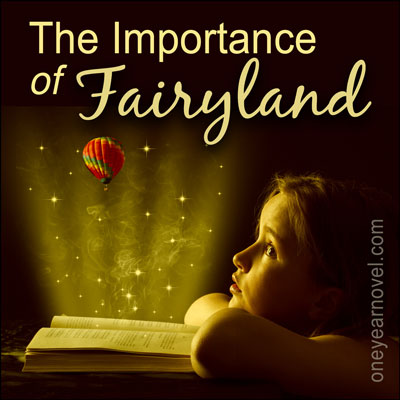The Importance of Fairyland
Addison Lucchi, Guest Contributor
Fairy tales do not tell children the dragons exist. Children already know that dragons exist. Fairy tales tell children the dragons can be killed.
– G.K. Chesterton
In my first post, I outlined several key elements that make a fairy tale what it is. Now I will endeavor to explain what it is that makes this kind of story truly important.
SOME DANGERS OF FAIRYLAND
A safe fairyland is untrue to all worlds.
– J.R.R. Tolkien
First of all, I think it’s important to understand the dangers of Fairyland. Whether you consider these dangers to be good or bad, you should at least know them in advance—both how they might affect you as a reader, and if you write a fairytale, how they might affect those you are writing for.
In “On Three Ways of Writing for Children,” C.S. Lewis defended the fairy tale against the common arguments for why children should not read fairy stories. By looking at these defenses, we can see some of the likely dangers of Fairyland—and also understand why these may not really be dangers at all.
1. False Impressions of Reality
The fairy tale is accused of giving children a false impression of the world they live in. But I think no literature that children could read gives them less of a false impression. I think what profess to be realistic stories for children are far more likely to deceive them.
– C.S. Lewis
The fairy tale is often accused of giving people—adults and children alike—false impressions of reality. The idea is that children will read a fairy tale and expect real life to be just like it, or that an adult will read a fairy tale and grow discontent with his own life in comparison.
However, Lewis refutes this idea by stating that he never expected the real world to be like the fairy tales—but he did expect the real world to be like the school stories, the kinds of stories that contain entirely possible adventures that are in reality almost entirely improbable.
Most readers are smart enough to not confuse real life and fairy tales. In fact, fairy tales can actually give readers a truer glimpse of reality. While it’s true that pain and evil exist, it’s also true that love and goodness will prove stronger.
Fairy tales help us to see that even though life isn’t easy or painless, good will win in the end, and all of our trials here will be worth it.
2. Unfulfilled Longings
It would be much truer to say that fairy land arouses a longing for he knows not what. It stirs and troubles him (to his life-long enrichment) with the dim sense of something beyond his reach and, far from dulling or emptying the actual world, gives it a new dimension of depth. He does not despise real woods because he has read of enchanted woods: the reading makes all real woods a little enchanted. This is a special kind of longing.
– C.S. Lewis
This danger is related to the previous, but it is also different. This is distinct from thinking reality is going to be like Fairyland—it is knowing that it isn’t, but wishing it was. It’s the longing to live in a land of magic, full of fantastic creatures and enchanted forests, and adventures. A land much more wonderful and exciting than our world.
But is this longing really such a bad thing? And is it really even unfulfilled? I think it is not only natural to have longings such as these, but also important. As Christians, we should have longings for a land that is better and more magical than our own—the land that is our True Home, which we will someday return to.
3. Fear
If I could have escaped all my own night-fears at the price of never having known ‘faerie’, would I now be the gainer by that bargain? I am not speaking carelessly. The fears were very bad. But I think the price would have been too high.
– C. S. Lewis
Children and adults alike understand that in fairy tales, there are going to be forces of evil as well as of good. There are going to be dragons in addition to fairies and princesses. But those of us who read fairy tales still choose to do so in spite of, or maybe even partly because of the dragons. Even if we know the dragon is going to be defeated, we want to know how. We want to know what obstacles the hero is going to overcome, and in what ways the hero will change as a result of her adventures.
By seeing the dragons beaten and the witches vanquished, we realize that our own fears can also be overcome.
There is plenty to fear in Fairyland—but even after knowing the dangers of Fairyland, we still choose to go into the wardrobe, or down the rabbit hole, or second star to the right and straight on till morning.
SOME MERITS OF FAIRYLAND
Now that we have covered some dangers of Fairyland and dispelled apprehension of entering it, let us discuss a few of its greatest merits:
1. Intelligence & Morality
If you want your children to be intelligent, read them fairy tales. If you want them to be more intelligent, read them more fairy tales.
– Albert Einstein
According to studies, exposure to fairy tales impacts intelligence. Reading fairy tales to children has a noticeable impact on their development.
Intelligence doesn’t just mean reason and logic; intelligence is the ability to acquire and apply knowledge. Reading fairy tales teaches you how to apply the lessons, experiences, and feelings you gather in the stories to real life, while also waking up your ability to wonder and imagine.
Many fairy tales—like those of Perrault and Anderson—are written with a specific moral or lesson in mind to teach children. Some are written with a looser theme, but the essential fairy tale morality is still there.
The morals of fairy tales are absolute—there is no relativism here. There is right, and there is wrong; there is good, and there is evil.
2. Escape & Recovery
It is the mark of a good fairy-story, of the higher or more complete kind, that however wild its events, however fantastic or terrible the adventures, it can give to child or man that hears it, when the “turn” comes, a catch of the breath, a beat and lifting of the heart.
– J.R.R. Tolkien.
Tolkien said that escape is one of the main functions of fairy tales—and not at all in a bad way. Fairy tales do offer an escape from the real world, but that is one of the functions of stories in general: to offer a temporary rest from the trials of life, while also equipping the reader for his re-entry. In this way, stories are like a Rivendell.
Reading fairy tales in particular offers a special recovery of the soul—a certain revival and a reawakening. Fairy stories are extraordinary in their ability to restore joy while also making trials and dilemmas of the real world seem so much clearer and somehow easier to face. They show us that happy endings might be true.
The consolation of the happy ending is an important part of fairy tales—what Tolkien calls the opposite of Tragedy: Eucatastrophe. When reading fairy stories, we expect this joyous turn, this miraculous grace that dispels darkness and denies defeat.
3. Joy & Sincerity
This ”joy” which I have selected as the mark of the true fairy-story, or as the seal upon it, merits more consideration.
– J.R.R Tolkien
Sincere joy is the primary reason why reading fairy tales is important.
Sincerity is especially valuable in the midst of cynicism and, arguably, postmodern thought. It is popular to believe that the happy ending is “contrived” and pure good is “naïve”… that simplicity is “boring” and that hope is “unrealistic.”
But the joy of fairy tales is stronger than the despair of cynicism.
Fairy tales are important because they bring light and truth into a culture that loves darkness and relativism. We need the simple, pure morals and happy endings of fairy stories. We need their recovery and their wonder. We need the sincere joy of fairy tales.
In the end, every true fairy story is simply a reflection of the Ultimate Fairy Story— the Gospel—a story that is entirely true and defined by wondrous joy. A story that proves that happy endings are more than true, and that goodness and truth will always prevail in the end.
Every man’s life is a fairy tale written by God’s fingers.
– Hans Christian Andersen
…
Have you ever had someone question you about the value of fairy stories? What did you say?
…
About Addison
Addison has been part of The One Year Adventure Novel (OYAN) since the very beginning, and he still loves the OYAN community with both of his hearts. He has a B.A. in English Literature, focusing on children’s literature and fairy tales. Mostly, he hopes to use his passion for stories and life to show people the joy and love of Christ. Teaching literature classes, playing music with friends, working at the library, and going on adventures whenever possible are some of Addison’s favorite activities!
Addison hopes to eventually release a collection of original fairytales, as well as complete his quirky time-travel mystery series. Notably, Addison also loves penguins.





Incredible! Fairy stories are extraordinary in their ability to restore joy while also making trials and dilemmas of the real world seem so much clearer and somehow easier to face.